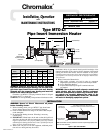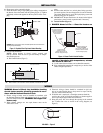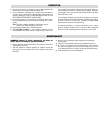
OPERATION
1. Do not operate heaters at voltages in excess of that stamped on the
heater since excess voltage will shorten heater life.
2. Always maintain a minimum of 2” of liquid above the heater to
prevent exposure of the effective heated length. If the heater is not
properly submerged, it may overheat and shorten heater life. DO
NOT OPERATE HEATER IF TANK IS DRY.
3. Be sure all trapped air is removed from a closed tank. Bleed the air
out of the liquid piping system and heater housing prior to ener-
gizing.
Note: The tank or heating chamber in closed tank systems
must be kept filled with liquid at all times.
4. Keep heating elements above sediment deposits.
5. Low Megohm Condition — The refractory materials used in
electric heaters may absorb moisture during transit or when sub-
ject to a humid environment. This moisture absorption results in a
cold insulation resistance of less than twenty megohms. Normally,
this megohm value corrects itself after heatup and does not affect
heater efficiency or life.
A low megohm condition can easily be corrected by removing the
terminal hardware and terminal enclosure and baking the heater in
an oven at 350˚F for several hours, preferably overnight. Note:
The lid must be removed from the housing.
An alternate procedure is to energize the heaters at low voltage
until the megohm reading returns to normal. When energizing
heaters in air, the sheath temperature should not exceed 750˚F.
MAINTENANCE
WARNING: Hazard of Shock. Disconnect all power to
heater before servicing or replacing heaters.
1. Heaters should be checked periodically for coatings and corrosion
and cleaned if necessary.
2. The tank should be checked regularly for sediment around the
heater pipe insert as sediment can act as an insulator and shorten
heater life.
3. Remove any accumulated sludge deposits from around pipe
and from tank.
4. Check for loose terminal connections and tighten if necessary.
5. If corrosion is indicated in the terminal housing, check terminal
box gasket and replace if necessary. Check conduit layout to cor-
rect conditions that allow corrosion to enter the terminal housing.
6. Clean terminal ends of all contamination.






